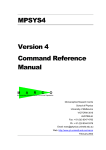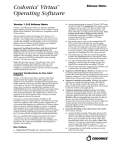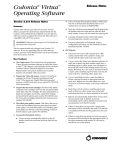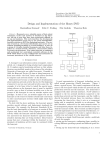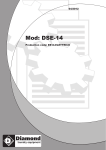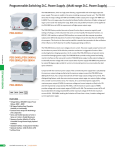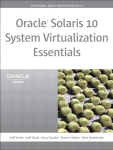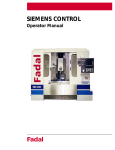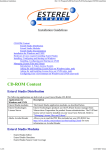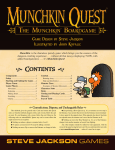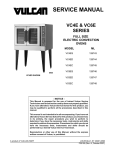Download zsh: Power Tools. Because having all your
Transcript
zsh: Power Tools. Because having all your fingers is overrated. zsh: Power Tools. Because having all your fingers is overrated. Paul L. Snyder <[email protected]> January 12, 2009 zsh: Power Tools. Because having all your fingers is overrated. zsh: Power Tools. Because having all your fingers is overrated. A non-partisan guide to shell selection zsh: Power Tools. Because having all your fingers is overrated. sh * The original Bourne shell * Written by Stephen Bourne for Version 7 Unix in 1977 * Usually, your ’/bin/sh’ is another shell running in compatibility mode Why should I use it? * You are writing a "portable" shell script * Your life will still be hell * If you’re writing a large system, use a real programming lanugage (Perl, Python, etc.) zsh: Power Tools. Because having all your fingers is overrated. ksh * David Korn’s Korn shell * MUCH better for programming than sh or *shudder* csh * Some interactive improvements * Two major versions, ksh88 and ksh93 (finally open-sourced in 2000) * The FSF released pdksh (mostly ksh88-compatible) Why should I use it? * Misguided nostalgia zsh: Power Tools. Because having all your fingers is overrated. csh * The "C" shell * Ha! * Introduced many now-standard interactive features (job control, aliases, !-substitution * Nastily brain-damaged scripting behavior * Csh Programming Considered Harmful: http://www.faqs.org/faqs/unix-faq/shell/csh-whynot * Implementations were historically very buggy * The modern (and proprietary) Hamilton C Shell brin the glory of csh to Windows. Why should I use it? * You are an idiot. zsh: Power Tools. Because having all your fingers is overrated. tcsh * The ’t’ is for ’TENEX’ * The TENEX OS (later TOPS-20) had command completion facilities * tcsh introduced programmable command completion to Unix shells * Kept the csh syntax Why should I use it? * You like having cool people laugh at you. * Actually, there is no good reason to use tcsh. zsh: Power Tools. Because having all your fingers is overrated. bash * The Bourne-again shell * ksh was proprietary and csh sucked, so bash was created * Considered a ksh descendant * Default shell for most Linux distributions * /bin/sh is usually bash under the covers (except on Ubuntuish systems) Why should I use it? * You like the safety of being one of the herd * Power scares you * You are pathetically grateful for finally receiving features zsh has had for years zsh: Power Tools. Because having all your fingers is overrated. The Z shell * Mostly descended from ksh * Absorbs interesting (and possibly conflicting) features from other shells * Possesses the lucid clarity of perl... * ...and the streamlined elegance of emacs Why should I use it? * See remainder of presentation, below zsh: Power Tools. Because having all your fingers is overrated. Shell usage... * Scripting - Make common tasks easier - Use POSIX sh for portability, not zsh = Portable shell code is non-trivial - Don’t write large systems using shell scripting! = Use, e.g., Perl, Python, Ruby zsh: Power Tools. Because having all your fingers is overrated. ...and Shell Usage * Interactive use - Make common tasks easier - Flexible command-line editing and history - Globbing - Completion zsh: Power Tools. Because having all your fingers is overrated. Agenda * Startup files * zsh’s modular design * Variables * Expansion and substitution * Interactive use * Completion zsh: Power Tools. Because having all your fingers is overrated. But first, a few words... * zsh in all its gory glory is unspeakably complex * Happily, you don’t need to know much to start using the shell * zsh rewards knowledge with power zsh: Power Tools. Because having all your fingers is overrated. Startup files Login files are run in this order ($ZDOTDIR defaults to $HOME): /etc/zshenv $ZDOTDIR/.zshenv /etc/zprofile $ZDOTDIR/.zprofile /etc/zshrc $ZDOTDIR/.zshrc /etc/zlogin $ZDOTDIR/.zlogin All shells, can’t be overridden All shells (with RCS option) Login shells (with GLOBAL_RCS) Login shells (with RCS) Interactive shells (GLOBAL_RCS) Interactive shells (with RCS) Login shells (with GLOBAL_RCS) Login shells (with RCS) zsh: Power Tools. Because having all your fingers is overrated. Shutdown files When exiting: $ZDOTDIR/.zlogout /etc/zlogout Login shells (with RCS option) Login shells (with GLOBAL_RCS) zsh: Power Tools. Because having all your fingers is overrated. How do you create your startup files? * zsh is pretty bland until it has been configured. * Most of the cool options are turned off by default. * Two courses: - Steal someone else’ .zshrc - Use the menu-based zsh-newuser-install (many distributions configure this to be run by default) zsh: Power Tools. Because having all your fingers is overrated. Running zsh-newuser-install - If this isn’t the case you can run it yourself: $ autoload -Uz zsh-newuser-install; zsh-newuser-install -f zsh: Power Tools. Because having all your fingers is overrated. zsh Modules * Portions of the shell are compiled as optional .so modules. They can be loaded using ’zmodload’. Modules include: - zsh/zftp: command-line FTP program - zsh/complete: Programmable completion system - zsh/net/socket: ’zsocket’ command to maniplate UNIX domain sockets - zsh/net/tcp: ’ztcp’ command to create and accept TCP connections - zsh/zpty: Run a command under its own pseudo-terminal zsh: Power Tools. Because having all your fingers is overrated. more zsh Modules * A few more modules of interest: - zsh/termcap and zsh/terminfo: output termcap and terminfo sequences by capability name - zsh/mapfile: tie a file to an associative array - zsh/newuser: menu-drive dot-file creation for new users - zsh/pcre and zsh/regex: Perl-compatible and POSIX regexes zsh: Power Tools. Because having all your fingers is overrated. Arrays $ beer=(’Hop Devil’ ’Golden Monkey’ \ > ’Old Horizontal’) $ print $beer[2] # or ${beer[2]} Golden Monkey $ print $foo[-1] # negative subscripts allowed Old Horizontal * Note that zsh arrays start from 1, not 0! * ’setopt ksharrays’ for ksh-style behavior * bash 3 supports arrays of this type zsh: Power Tools. Because having all your fingers is overrated. Associative Arrays! $ typeset -A collective $ collective=(larks exaltation ravens \ > unkindness crows murder) $ print $collective[larks] exaltation $ print ${(k)collective} larks ravens crows * You may be familiar with these as perl hashes * Associative array support will be coming in bash 4 zsh: Power Tools. Because having all your fingers is overrated. Typed numeric variables * * * * Integers: Alternate base integers: Floating point, fixed notation: Floating point, sci notation: $ zmodload zsh/mathfunc $ (( pi = 4.0 * atan(1.0) )) $ echo $pi 3.1415926536 typeset typeset typeset typeset -i -i -F -E foo 16 bar baz womble zsh: Power Tools. Because having all your fingers is overrated. Fun with typeset * Create a tied variable/array pair: typeset -T FOO foo * Create a variable that always expands to lowercase: typeset -l BAR * Or uppercase: typeset -u BAZ * Make a variable read-only: typeset -r WOMBLE * Keep array entries unique: typeset -U path zsh: Power Tools. Because having all your fingers is overrated. Prompts * PS1 displayed at regular command prompt * PS2 for second-level prompt - Also displays details of nested shell constructs * PS3 displayed inside ’select’ construct’ * PS4 is the trace prompt * RPS1 and RPS2 are right prompts! ’RPS1=%t’ zsh: Power Tools. Because having all your fingers is overrated. Prompt expansion (a partial list) %M %m %n %y %h %n %t FQ hostname %# ’#’ if shell has root, ’%’ otherwise hostname up to ’.’ %_ nesting status of shell constructs (PS2) username %d Present working directory - $PWD User’s login tty %3d Last three components of $PWD Current history num %i Line number of a trace (for PS4) Current script or func %D Date in yy-mm-dd time in 12-hour format zsh: Power Tools. Because having all your fingers is overrated. A bit more prompt expansion %{..%} Escape sequence %D{format} format date using strftime(3) %(x.true-text.false-text) Ternary expression E.g. %# = %(!.#.$) Alternately %n(x.true-text.false-text) or %(nx.true-text.false-text) where n is an integer Tests: ! privileges # effective uid is n ? exit status of last command is n d day of the month is n / current absolute path has n elements zsh: Power Tools. Because having all your fingers is overrated. Expansion and Substitution When you enter a command at the prompt, it is mangled as follows: 1. History Expansion 2. Alias Expansion 3. Process Substitution, Parameter Expansion, Command Substitution, Arithmetic Substitution, and Brace Expansion 4. Filename Expansion 5. Filename Generation ("globbing") zsh: Power Tools. Because having all your fingers is overrated. History * History is inspired by csh’s history system - setopt CSH_JUNKIE_HISTORY to lobotomize zsh !! is the last command executed !!$ is the last word of the last command !n refers to history command numbered ’n’ ’history’ for a list, or add ’%h’ to your prompt !str last command starting with ’str’ !# is the command you are typing right now! !?str[?] is the last command containing ’str’ !{...} prevents confusion with surrounding text zsh: Power Tools. Because having all your fingers is overrated. Selecting a word in a history line 0 n ^ $ % n-m * the first word the nth argument the first argument the last argument the word match by a ’str’ search words n through m all the arguments zsh: Power Tools. Because having all your fingers is overrated. History modifiers For extra fun, use these with regular parameters! h t r e l u remove one trailing path component remove all but the last path component remove filename extension remove everything but the extension convert all words to lowercase convert all words to uppercase [g]s/old/new[/] Replace ’old’ string with ’new’. if ’new’ contains ’&’, ’&’ is replaced with ’old’ zsh: Power Tools. Because having all your fingers is overrated. ...and Modifing the Modifiers! f F:expr: w W:sep: repeat following modifier exhaustively repeat following modifier expr times apply following modifier to each word like w, but applies to parts of string that are separated by ’sep’ zsh: Power Tools. Because having all your fingers is overrated. Parameter expansion * All the usual suspects. E.g.: $ echo ${foo?BAR} BAR $ foo=FOO $ echo ${foo?BAR} FOO $ baz=/this/is/a/path $ echo ${baz%is*} /this/ $ echo ${baz/*is} /a/path zsh: Power Tools. Because having all your fingers is overrated. Change things up with parameter expansion flags There are LOTS of these...this is just a small selection Place in parentheses before the parameter name, e.g., ${(%)PS1} % C L o O u Expand prompt sequences Capitalize each resulting word Convert all letters to lowercase sort words in ascending order sort words in descending order expand only first unique occurence of each word j:str: join the words of arrays using ’str’ q quote the expanded words zsh: Power Tools. Because having all your fingers is overrated. Filename generation, a.k.a. globbing - You all know about *, ?, [x] and [^y]. - How about ’ls bar<2-6>’? existing files Only matches - ^*FOO* globs all files without ’FOO’ in their names - *(foo|bar)* globs files with either ’foo’ or ’bar’ - ba^z* globs ’bar’ but not ’baz’ - (foo)# matches zero or more ’foo’s...(foo)## matches any number zsh: Power Tools. Because having all your fingers is overrated. It gets worse... - Use ksh-style glob operators to tweak your parentheses - *(foo) matches zero or more ’foo’s - ?(foo) matches zero or one ’foo’s - +(foo) matches one of more ’foo’s - !(foo) match anything BUT ’foo’ - Are you frightened yet? zsh: Power Tools. Because having all your fingers is overrated. We’re not done...it’s time for globbing flags! - (#l) lowercase characters match upper or lower case; uppercase matches uppercase - (#I) reenables case sensitivity - (#b) activate backreferences for parenthesized groups; store the matches in the $match arra and the indices in $mbegin and $mend - (#B) ends backreferencing. - (#aN) Use approximate matching! Allow up to N errors in the match. zsh: Power Tools. Because having all your fingers is overrated. Ye gods, there’s more! Glob qualifiers appear in parentheses at the end of a glob specifier... *(.) matches regular files only *(/) matches all directories *(@) matches all symbolic links *(x) matches all owner-executable files *(s) matches all setuid files *(f{go+w}) matches group or other-writeable files! This next one even scares me... *(estring) executes string as shell code! The currently matched file is available in $REPLY; override the return with $reply or $REPLY. Yipes! zsh: Power Tools. Because having all your fingers is overrated. Recursive Globbing One last trick... $ ls **/foo* Matches ’foo*’ in current directory or any subdir! zsh: Power Tools. Because having all your fingers is overrated. ...And now for something completely simple for x in *; do mv $x ${x:r}.bak; done Too much work! In zsh, just use for x in *; mv $x ${x:r}.bak Actually, this is now deprecated, so it’s a bad habit that I keep using it. Similar short forms exist for ’if’, ’while’, and so on. Even better better: zmv ’(file0?)’ ’$1.bak’ zsh: Power Tools. Because having all your fingers is overrated. zmv * zmv is the command-line rename tool you’ve always wanted $ $ $ $ zmv ’(*)-(*).mpeg3’ ’$2_$1.mp3’ zmv ’(*)’ ’${(L)1}’ alias mmv=’noglob zmv -W’ mmv *.pl.bak backups/*.pl zsh: Power Tools. Because having all your fingers is overrated. Correction * Oopsing commands? ’setopt CORRECT’ * Fat-fingering filenames? ’setopt CORRECT_ALL’ * Prevent a command from being corrected: alias mv=’nocorrect mv’ zsh: Power Tools. Because having all your fingers is overrated. MULTIOS and redirection setopt MULTIOS for built-in tee functionality $ ls >>file1 >file2 | cat $ : > * This truncates every file matched by *! Well, not quite, as long as NO_CLOBBER is set. For maximum damage, use $ : >| * zsh: Power Tools. Because having all your fingers is overrated. More MULTIOS How about a NULLCMD? $ <first <second >combined Change the default command by setting NULLCMD to something other than ’cat’ $ >combined zsh: file exists: combined NOCLOBBER saves your bacon. zsh: Power Tools. Because having all your fingers is overrated. Useful interactive features * Multi-line editing * Variable editing! ’vared path’ * ’zed’ is zsh’s built-in editor...use your zsh bindings for a quick edit (use C-j to save and exit or C-g to cancel) * One of my favorites: the buffer stack $ bindkey ’\eq’ push-line-or-edit * Stuff the buffer with ’print -z’ zsh: Power Tools. Because having all your fingers is overrated. Finally, completion * I’m not going to tell you how to write new completion functions * I don’t want to be lynched. * Besides, most anything you’d want to complete is probably in there already. * To get started using completion, just turn it on when you run zsh-newuser-install zsh: Power Tools. Because having all your fingers is overrated. Education through Completion * Forgot an option? Just hit TAB * Look at completions for ’tar’, ’mplayer’, ’emerge’, or ’dpkg’ zsh: Power Tools. Because having all your fingers is overrated. Bedtime reading * man zsh and its 15 subpages (or just man zshall) * http://www.zsh.org - Read the zsh user manual...friendly and useful * Tips and tricks - http://www.rayninfo.co.uk/tips/zshtips.html - http://www.grml.org/zsh/zsh-lovers.html * http://www.zshwiki.org zsh: Power Tools. Because having all your fingers is overrated. Fin. zsh: Power Tools. Because having all your fingers is overrated. Selecting a random file from the current directory $ files=(*); echo $files[$RANDOM%$#files]] zsh: Power Tools. Because having all your fingers is overrated. For the brain-damaged by Windows: file associations $ alias -s txt=less This can be bad for security! zsh: Power Tools. Because having all your fingers is overrated. Global aliases work anywhere in the line $ alias -g ...=’../..’ $ alias -g L=’| less’ $ alias -g G=’| egrep’ zsh: Power Tools. Because having all your fingers is overrated. Name your favorite directories with CDABLEVARS zsh: Power Tools. Because having all your fingers is overrated. Eschew cd with AUTOCD and AUTOPUSHD

























































